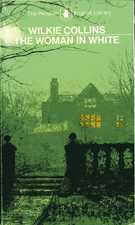Review: ‘The Woman in White’ by Wilkie Collins
Author: Wilkie Collins
Published: Penguin,1974, pp. 648
Genre: Classic mystery fiction
Blurb: Wilkie Collins’ sixth novel took the fashionable world by storm on its appearance in 1860 when everything from dances to dresses was named after the ‘woman in white’. Its continuing power to fascinate stems in part from a distinctive blend of melodrama, comedy and realism; and in part from the power of its story. Yet The Woman in White is more than just a classic thriller, and contemporary critics have found in it a feminist parable for our times.
When, where and why: I have no recollection whatsoever of buying this book, so I’m going to assume it’s been hanging around on my shelves for quite some time. I picked it up to read now because there’s something about the colder weather which makes me want to read classic literature, and this one looked interesting. It’s also book 23/50 for my Books Off the Shelf Challenge, and counts as 3/4 of my books towards the R.I.P. Challenge.
What I thought: After finishing this book I feel compelled to impersonate Mrs Bennet by throwing my hands into the air and exclaiming, “Oh, Mr Collins!” I really enjoyed this book and, like so many authors I’ve discovered this year, I can’t believe it’s taken me this long to find out how good he is. I have vague memories of reading The Moonstone when I was eleven (which I’ll now have to go back and reread) but I can’t remember enjoying it anything like as much as The Woman in White, probably because I was too young to appreciate it properly.
I found The Woman in White to be a very skilfully written work as it is presented from so many different perspectives. The story is set up as evidence for the mystery of the eponymous woman in white, and so it is necessary for a string of characters to take charge of the narrative as the story progresses in order for the reader to be presented with a first hand view of important events. Impressively, each character has a different and appropriate narrative style, with just the voice and preoccupations I would have imagined for them: Walter Hartright is romantic, emotional, and prone to waxing lyrical about things; Miss Halcombe is precise and detailed; the lawyer is sparse and abrupt. I thought that the use of these different voices adds texture to the novel and helps to create suspense, as the individual characters reveal their information separately for the reader to piece together.
In Marian Halcombe, Collins has created a great female character. She is resourceful, intelligent and strong-willed while still being constrained by her position in Victorian society. She’s the sort of character I was was real because if she was, I’d want to have her round for tea and be her friend. Had I been Walter Hartright, I would have fallen in love with Marian instead of Laura Fairlie (I notice that Collins is careful to state how ugly Marian is when she is introduced, which I assume is an attempt to explain this preference). Where Marian seems real and lively, Laura Fairlie is a typical, insipid woman-written-by-Victorian-man; it works well in the context of the story, but I wish she’d been a bit more interesting. Like Marain, Count Fosco is also a brilliant creation, but to say more would give too much away.
The story itself is engrossing. Perhaps it’s due to my not reading many mysteries, but I found myself falling for every trap and red herring that Collins wove into the narrative. This certainly didn’t diminish my enjoyment of the story; in fact, I found myself relishing being led around by Collins while convinced (incorrectly) that I had figured out the solution to the mystery. I liked the slow, drawn out pace with which the narrative progressed (presumably partly due to its original publication in serial) and thought that it added to the suspense, as I had to wait until Collins was good and ready to reveal what happened next.
My only criticism of this novel is the way in which Collins solved the mystery. It wasn’t the conclusion that I objected to at all, but the bizarre way in which Walter Hartright eventually uncovered it, completely unconnected to anything else in the text so far. I couldn’t have been more flummoxed if a talking unicorn had suddenly popped up and solved everything for him. While this seemingly strange addition was probably an enjoyable twist for Collins’ contemporary readers who enjoyed sensational literature, I found it out of character with the rest of the book and I wish the mystery had been concluded in a less surprising way more in keeping with the narrative so far. However, I understand that I’m looking at this as a modern reader and so with different priorities. Nonetheless, this didn’t diminish my enjoyment of the novel and I can’t wait to read more by this author.
 Where this book goes: The old Penguin copy I read was quite tatty before I began and had fallen apart by the time I finished reading it. However, I enjoyed the book far too much not to have a copy of it to keep around and so ordered a more durable looking hardback Everyman edition from Amazon Marketplace.
Where this book goes: The old Penguin copy I read was quite tatty before I began and had fallen apart by the time I finished reading it. However, I enjoyed the book far too much not to have a copy of it to keep around and so ordered a more durable looking hardback Everyman edition from Amazon Marketplace.
Tea talk: Until recently when I managed to guilt someone into sorting it out by subtly walking past the facilities manager wearing my coat, scarf and hat, there’s been no heating in my office at all. Consequently, I’ve been drinking Lapsang Souchong in an attempt to make myself feel warmer. I’ve decided this is the perfect winter tea, because it smells like sitting in front of an open fire. Expect many more tea notes waxing lyrical about this smokey tea.
8 Responses to “Review: ‘The Woman in White’ by Wilkie Collins”
Comment from Stephanie
Time October 22, 2010 at 1:01 am
I loved this book! I read it last year for RIP and I just loved the way it was written.
Comment from Lyndsey
Time October 24, 2010 at 6:03 pm
Hi oldenglishrose,
Thanks so much for stopping by my blog. I’m so happy to have found my tea-soulmate – I love this ‘tea talk’ you do!
And I felt absolutely the same way about Woman in White. It was all going so well until the ludicrous ending….
Lyndsey
Comment from oldenglishrose
Time October 24, 2010 at 10:44 pm
Thank you for the recommendations. I think he’s going to become a favourite of mine too if this book is anything to go by.
Comment from oldenglishrose
Time October 25, 2010 at 9:44 am
It was very clever, wasn’t it? I liked the fact that there was no all-seeing narrator, so the reader was kept in the dark along with the characters for much of the novel. I’m glad you enjoyed it too.
Comment from oldenglishrose
Time October 25, 2010 at 9:46 am
Thank you too! I’m always happy to find a fellow tea and book lover, particularly one who also thinks that the ending of this book was a little bit silly.
Comment from deslily
Time October 25, 2010 at 8:47 pm
you’ve read some really good books! I love the woman in white, but I think I love the Thirteenth Tale even more! (wow, more than wilke collins?!..yup)…excellent choices to read!
Comment from oldenglishrose
Time October 26, 2010 at 11:55 am
Thank you. I’ve been lucky with my book selections for this challenge and it’s reminded me how much I enjoy these sorts of books. I really enjoyed ‘The Thirteenth Tale’ too.



Comment from Helen
Time October 21, 2010 at 8:16 pm
Wilkie Collins is one of my favourite authors, so I’m glad to hear you enjoyed this book! If you want to try more of his work I would highly recommend both Armadale and No Name.